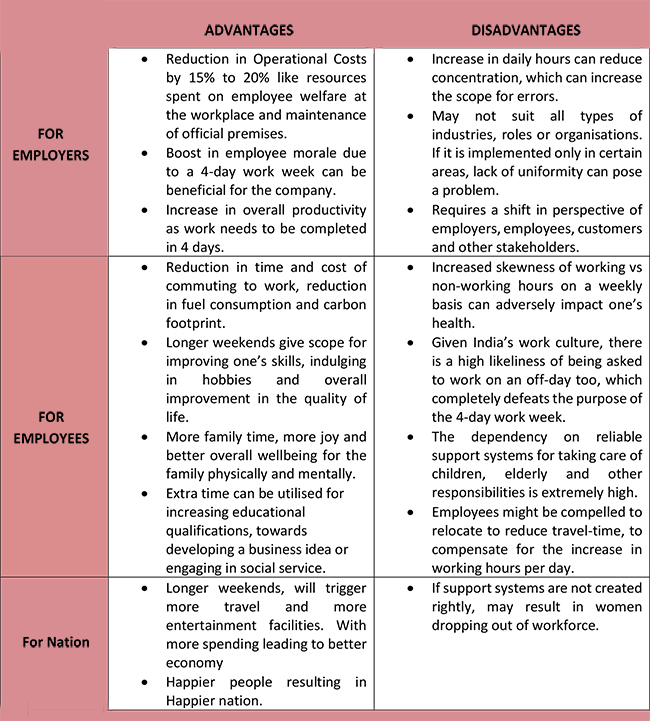India’s work culture is synonymous with overtime, working on weekends or holidays, and being one call away almost all the time for an official task. Predominantly, Indian employers do not value the personal time of their employees. Since this culture has been established, many Indian employees too believe that the more they work, the better it is. Even those who don’t subscribe to this erroneous outlook are victims of it since they have to comply with it to safeguard their financial interests against the stiff competition, they face from the perennially overflowing pool of labour supply.
New Policy:
In the backdrop of such a toxic overworking culture, comes a breath of fresh air; the Union Ministry of Labour and Employment is proposing an optional Four-Day Work Week. Employers and employees can together choose a four, five or six-day week, depending on their preferences. “It will now be mutually agreed to by the employees and employers as to what is appropriate for them” said Labour Secretary Apurva Chandra.
While this may seem exciting for employees at first, the stench of the older laws still exists, as there is no change in the 48-hour weekly limit on the number of working hours. To put that in perspective, a four-day work week will involve 12 official hours on each working day, for a company that opts for it. A 6-day week will involve 8 hours of official work and a 5-day week, close to ten hours a day.
Pros and Cons:
The possibility of a Four-Day work week has certain pluses and minuses for both employers and employees, as detailed below:

Past Experiments:
The global demand for a shorter week is high. In 2018, The Workforce Institute at Kronos and Future Workplace surveyed nearly 3000 workers across 8 countries as part of a study, and most people said they would prefer a shorter work-week.
Globally there have been instances of companies that experimented with or adopted the 4-Day culture and saw an improvement in employee welfare and the performance of the company. One of the most recent and popular examples is that of Microsoft in Japan in 2019, when productivity increased by 40%. It also conserved office resources, as reflected in the reduction in the number of pages printed (58.7%) and electricity consumed (23.1%).
Perpetual Garden, an estate-planning firm in New Zealand, has adopted the 4-day work week permanently, after experiments pointed to a win-win situation for both employers and employees.
In India too, Beroe Inc., which is a pioneer in the market intelligence and compliance space, piloted and implemented the 4-day work week in 2017 after seeing a huge jump in productivity (200%), increase in customer satisfaction by 10%, reduction in employee-attrition to a third of previous levels, and increase in employee satisfaction from 3 to 4.3 out of 5.
Making it work:
The 4-day work week can be beneficial, both operationally and financially, for companies and employees, provided that the spirit of the proposed policy is upheld. There must be a paradigm shift in the way the workforce as a whole perceives the number of hours worked. Increase in number of hours does not mean more output, and can actually be detrimental to productivity.
Since the proposed labour law is optional, companies have the added benefit of being able to try it out, and adjusting the suitability according to their specific needs. Strict enforcement of non-working days is essential for the success of the 4-day week. Support systems and modified employee welfare mechanisms can accelerate the journey to success based on multiple parameters, such as employee satisfaction, resource optimisation and financial results.
To sum up:
The four-day work week system is advantageous in the long run. However human beings have a tendency to hold on to their comfort zone. An overarching shift in perspective regarding the four-day work week must occur in all the stakeholders in the entire value chain, for it to be a success. Active change management practices can be initiated by corporate leaders – increasing awareness about the advantages, addressing concerns of stakeholders (particularly customers), guiding subordinates in the transition and correlating the shift with key performance indicators. Such a shift in perspective across stakeholders must also reflect in the support services available to an individual in taking care of his/her personal responsibilities like children, aged parents and the home front. This will consequently benefit those working in such industries too.
When a change in mind-set regarding the number of working days in a week happens and reflects in society, the benefits can be reaped for a long period after the transition.